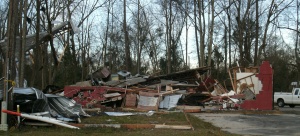How to Help in A Disaster
With all the recent disasters we see and hear about, it’s human nature to want to help our neighbors both near and far in need. But it’s often not clear what is the best way to really be of assistance. This is why I am reprinting a post on this subject from a federal disaster worker at AllExperts.com.
Question:
What would you say are the best things to do after a major disaster? To help someone else, not yourself.
John Doe
Answer:
John, thanks for asking.
If you are not in a disaster but want to assist people who have been affected by one, there are several things you can do. There are also certain things you should not do.
First, support organizations which are responding to the disaster. Non-profit organizations which respond to disasters are not funded by the government and need financial support. Choose your favorite, the one you think does the most good and donate money to them. You can find a list of National Voluntary Organizations Active in Disaster (NVOAD) here: http://www.nvoad.org/ These are recognized organizations and will not scam you.
Unless specifically requested, do not donate clothing, food or other items. During Hurricane Andrew, tons of donated items had to be disposed of in Florida (fur coats, kitchen utensils, old shoes) because they were not needed and/or there were not enough people available to sort through them. There was no place to store much of the donations and they became wet, moldy and a health hazard.
There are agencies in the NVOAD (above) who do take donations of clothing, food, water and other in-kind donations, so check with them and ask what they need.
Seeing the suffering caused by a disaster makes most people want to help in some way. If you would like to volunteer, go ahead and find an organization which can give you the proper training and credentials so that you can really help. Many NVOAD groups have free classes in disaster response and relief and you can sign up and take them. Other agencies have need for people with special skills (counseling, social work, massage therapy, cooking, building, etc,) and are happy to find new volunteers.
Please don’t just go to a disaster area to volunteer. There are several reasons for this, First, disaster areas are usually dangerous with debris and limited emergency services. Police and sheriff’s departments are stretched thin, as are fire departments, paramedics and hospitals. Trying to find a place for unattached volunteers to work is just not a priority when disaster survivors need their attention.
During Hurricane Katrina, fire departments from all over the country just took it upon themselves to travel to Louisiana. I was there at the firefighters’ staging area. Although their hearts were in the right place, it was sometimes a strain on local responders trying to find them a place to stay and assign them to work teams. You don’t really think about it, but when people’s homes are destroyed, they are staying in motels and eating at restaurants. If too many workers come into the area, they take up those rooms that the disaster stricken families need. When I first got to Katrina, there was no power and no food shipments coming in. I went to a Burger King drive in one night and the sign said, “We have burgers, no buns.” The next night I went through and it said, “We have buns, no burgers.”
I know this is a lot, but finally, let me say: be prepared.
-Get your home ready for a disaster, have a disaster go bag, water, medications, a disaster plan, a place to shelter inside the house.
-Designate a family meeting place and someone outside the area to contact in case you and your family get separated. (Sometimes phones don’t work locally but connect to other cities and states)
-Make sure you have appropriate insurance (Home owners insurance does not normally cover flood damage).
-Keep your important papers (deeds, car registration copies, insurance papers, utility bills) somewhere that is safe and waterproof
-Take them with you if you have to evacuate.
-Learn first aid and CPR, find out what your community’s emergency plans are.
-Vote. Pay attention to which of your representatives supports government disaster response. The money that goes to disaster victims is the money they (and you) have been paying in as taxes. It is your disaster savings account. And if it is ever your turn, you will need the same aid.
That about covers it. I hope you decide to become a disaster volunteer or get a job with a disaster agency or company. There’s no better feeling than helping someone who has lost everything. I know, I’ve been there.
Allexperts.com
Posted on May 17, 2014, in agencies, assist, disaster, FEMA, firefighters, helping, saving, victims, volunteer and tagged aid, assistance, CPR, disaster, disaster plan, donate, FEMA, fire fighters, firefighters, first aid, funds, help, hotel rooms, important papers, in kind, need, plan, representatives, restaurants, shortage, State, survivors, victims, voluntary agencies, volunteer, vote, voting, workers. Bookmark the permalink. Leave a comment.

Leave a comment
Comments 0